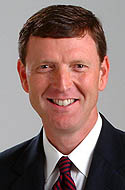Faith in Politics: Iowans reflect on the role of religion in politics
Iowa politicians offer a wide array of opinions on the role of faith in politics, with some saying they can’t be separated and others saying there must be a clear delineation between the two.
Jul 31, 202044.9K Shares1M Views
Iowa politicians offer a wide array of opinions on the role of faith in politics, with some saying they can’t be separated and others saying there must be a clear delineation between the two.
Faith plays an important role in politics across the nation, but maybe more so in Iowa. A recent poll from NBC News/Marist shows 91 percent of potential Republican caucusgoers in the state identify as either protestant or Catholic. Of those, 40 percent consider themselves fundamentalist or evangelical Christians.
That same poll also shows potential Republican caucusgoers place more importance on whether a candidate shares their values than their stances on issues, experience or electability. Thirty-one percent identified shared values as the most important quality of a presidential candidate, compared to 29 percent for stances on issues, 19 percent for governing experience and 18 percent for ability to defeat President Obama in 2012.
Bob Vander Plaats
“I think from the founding of this country faith played a very important role,” said Bob Vander Plaats, a three-time Republican gubernatorial candidate and current head of a religious conservative advocacy group, The Family Leader.
“You look at the founding fathers, several of them were very clear that in order for a republic like America to exist and succeed it hinges on two rungs: religion and morality,” he said. “And the religion piece, I believe where the founding fathers were coming from…we needed to understand as a people that there’s a higher authority than government and laws that aren’t congruent with God’s laws are really no laws at all.”
Vander Plaats championed former Arkansas Gov. Mike Huckabee‘s successful 2008 Iowa Caucus campaign, when he defeated several more moderate candidates.
“He frequently said ‘I’m Mike Huckabee, I’m a man of faith, I pray for my family, I pray for my country. I can’t separate who Mike Huckabee is in office and in my personal life,’” Vander Plaats said.
“I think faith in politics play a huge role.”
Image has not been found. URL: http://media.iowaindependent.com/kim_pearson_125.jpgKim Pearson
Rep. Kim Pearson, a Pleasant Hill Republican who has endorsed Ron Paul‘s 2012 White House bid, agreed that it’s not reasonable for people to separate their faith from their politics.
“Faith is an integral part of a person,” she said. “You can’t separate it and, no matter what people say, their faith plays a role. And people are watching to see if they actually do those things which they say.”
She also said a person’s faith is important in how they interpret America’s founding documents.
“As an American constitutional-conservative type of person, your faith is integral in how you understand our documents like the Declaration of Independence and the Iowa Constitution, which talk about our creator,” Pearson said. “So it’s an artificial notion that you can separate those things.”
But others, like Sen. Matt McCoy, said there should be a line between religion and politics and faith should play more of a role within individuals than in public policy.
Image has not been found. URL: http://media.iowaindependent.com/matt_mccoy_125.jpgMatt McCoy
“I think that faith is something that’s contained deep in you and you have the right to kind of keep it as something that’s private or separate from your public persona,” said McCoy, a Des Moines Democrat that’s openly gay.
“I think when others push faith issues and indicate to you that you’re doing something wrong or you’re somehow falling short of their expectation then I think it’s offensive.”
McCoy noted there’s also “a huge difference” between the two major parties when it comes to faith. He said a person’s faith is more a determination of a person’s quality and qualifications in the Republican Party.
“One of the things I see in this whole Romney issue related to his faith is if you want to be successful in politics you’ve got to do X, Y and Z and you’ve got to be a Christian,” McCoy said.
Connie Ryan Terrell, executive director of the Interfaith Alliance of Iowa, agreed that people can’t remove their faith when they go into politics. She said the difficulty comes when someone wants to insert their religious beliefs into a political debate and eventually public policy.
Image has not been found. URL: http://media.iowaindependent.com/connie_ryan_terrell_125.jpgConnie Ryan Terrell
“If you have a candidate who believes a particular thing and bases that policy they want to include solely on their religious belief and inserting that into public policy, that’s something to be taken seriously and something people need to be concerned about,” she said.
Terrell said she thinks it’s “blatantly wrong” for candidates to use the name of Jesus Christ or other names in Biblical tradition and base their stances on those beliefs.
She said that kind of rhetoric that happens in the election process is concerning to her organization, and elected officials need to distinguish their elected responsibilities from their faith tradition.
“If they are fortunate enough to hold that office they pledge their allegiance to the Constitution, not to the Bible or any other religious text,” Terrell said. “And they need to make sure that if they are in public office and the two come into conflict, the Constitution and the Bible or another holy text, that they can as a public official uphold the Constitution first.”

Paula M. Graham
Reviewer
Latest Articles
Popular Articles
